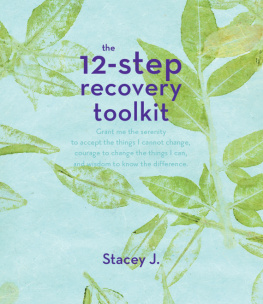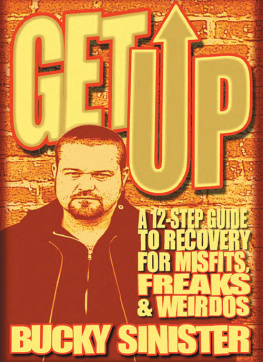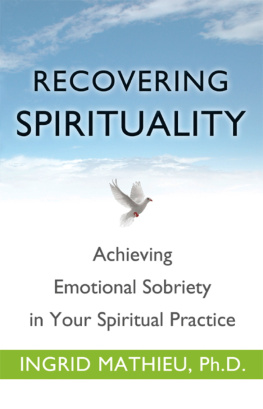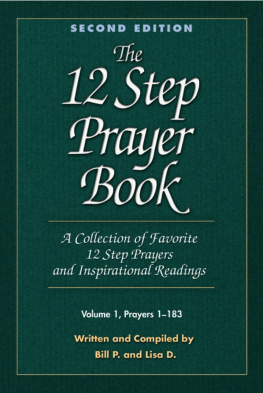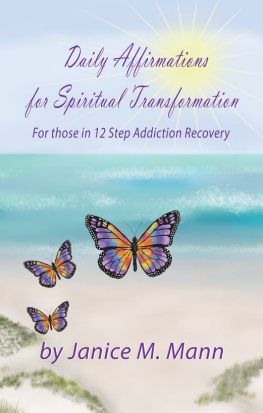
First published in 2010 by
Red Wheel/Weiser, LLC
With offices at:
500 Third Street, Suite 230
San Francisco, CA 94107
www.redwheelweiser.com
Copyright 2010 by Stacey J.
All rights reserved. No part of this publication may be reproduced or transmitted in any form or by any means, electronic or mechanical, including photocopying, recording, or by any information storage and retrieval system, without permission in writing from Red Wheel/Weiser, LLC. Reviewers may quote brief passages.
ISBN: 978-1-57324-460-2
Library of Congress Cataloging-in-Publication Data is available upon request.
Design: Donna Linden
Cover illustration: Vika Valter/iStockphoto.com
Interior illustrations: Ok-5/iStockphoto.com
Production Editor: Michele Kimble
Copy Editor: Rachel Leach
Typeset in Perpetua and Neutra
Printed in China
MD
10 9 8 7 6 5 4 3 2 1
www.redwheelweiser.com
www.redwheelweiser.com/newsletter
Contents
My Story
BEFORE I TELL YOU MY STORY, it is important that you know that I do not speak for any 12-step program. This is simply my experience.
My name is Stacey, and I'm a food addict. I am also the child of alcoholics, a defining fact of my life.
I grew up in a home where my father's temper and the threat of his temper overshadowed everything. When he was drinking, my father was often cruel, even vicious. Both of my parents drank steadily every evening, and I learned to stay out of their way at night. But they got up every morning for work, beginning the cycle anew each day. They were both that brand of alcoholic sometimes referred to as functional, holding down their middle-class jobs and never missing a day of work due to their drinking.
In addition to her alcoholism, my mother was bulimic. She would eat like a bird all day, and then binge at night in secret. Occasionally, she would enlist my help on a late-night drive to the fast food store, and she kept a secret stash of sweets alongside her hidden stash of wine so that my father couldn't monitor her drinking or know about her eating. Lying in my bed on the second floor of our house, I could hear the sound of her vomiting coming up through the vent from the basement laundry room. On the rare occasion that I mentioned it, she said it was heartburn. I used to get very angry when I found her empty chocolate boxes hidden here and therenot because I worried about her, but because I wanted the chocolate for myself. Had I known what a compulsive overeater was, I might have taken this as an early sign of my own nascent addiction.
My parents were unhappy most of the time. But the rule in our home seemed to be that neither parent challenged the other's excessive drinking, and so we existed in a kind of tense, miserable stalemate punctuated by loud alcohol-induced fighting.
Having smoked and drank for most of his life, my father had some related health problems. When I was ten, he developed serious pneumonia for the second time, and the doctor said that he had to quit smoking or he would die. He added, your liver's not much better, so you should quit drinking, too. My father agreed to quit smoking, but said that if he couldn't drink, he might as well be dead.
My own experience with addictive behavior manifested very early. I was born ravenously hungry, and that hunger never left me. I craved sweets all the time, and stuffed my face with whatever I could get my hands on. When I was about four years old, I found a box of chocolate-flavored laxative in the medicine cabinet and ate the whole pack in one gulp. I told my mom, who literally ran me to the washroom, where I remained for quite a while.
Candy and baking were rarely available in my home, so I hung out with a friend whose kitchen was always well stocked. I raided the cupboards of anyone's house I visited, stealing food if it wasn't offered.
Although I didn't binge daily as a child, I overate regularly. I just didn't have a stop button when it came to my appetiteonce I started eating, I couldn't stop, and no amount of food seemed to make me feel full. I was teased as early as Kindergarten for being a fat kid, and I felt a great deal of shame for my appearance. In a school where the fast-running, athletic kids were the most popular, a bookish fat kid did not fit in. I never felt like I belonged, and even though I acted proud of my different-ness, I felt alienated and lonely inside.
When I was six, my friend taught me how to steal candy from the local store. I felt both liberated and exhilarated by my new skill. Freedom! I could get candy whenever I wanted, as long as I was brave enough to risk it and smart enough not to get caught. For many years after that, I felt that stolen food just tasted better.
Through my childhood and early adolescence, my stealing food and stealing money to buy food increased. I stole from my mother in gradually increasing amounts because she didn't keep a close watch on how much money she kept in her purse. At the local convenience store, I had a stealing ritual. I'd go in with my bag open discreetly, walk a certain path down the aisles, and casually put the same items in my bag: chocolate bars, then cheese balls, and then back to the chocolate. I'd buy one item so that the shopkeeper wouldn't suspect, and hide about eight to twelve stolen items in my bag.
Fortunately, I was never caught stealing candy. I made myself stop when I got to the age of 16 because I knew the penalties would be stricter once I could be convicted as an adult. But that was an excellent motivation to get a job, so I could have my own money to buy candy.
I had always been fat and had always been teased for it, but at thirteen, I joined the high school swim team and watched the fat disappear with those daily workouts. Suddenly, I got lots of attention from boysattention I had been starved for, but certainly didn't know how to handle. Although I continued to binge once or twice a week through my teens, the swimming kept me slim.
During my thinnest period in high school, I did manage to restrict my eating, and I became quite thin. I felt proud that I could ignore the hunger signals from my body, and wished I could stop eating altogether. That brush with anorexia lasted for about a year, and remains the only time in my life when I have been able to restrict my eating. Restricting my food gave me a feeling of floating above it allno feelings touched me, not mine or anyone else's. In a way, it did for me what bingeing had done before: it insulated me from feeling.
Having always been a good student, I entered university as planned. During my first few months there, I drank seriously for the first time. My tolerance for alcohol grew quickly, and it scared the hell out of me. Within weeks of starting to drink, I had a much higher tolerance than my friends with several years of drinking experience. After I had to make the embarrassing phone call to my mother when I didn't make it home one night, I decided to pull way back on my drinking. I knew that with both nature and nurture against me, I shouldn't dare mess around when it came to alcohol. Unfortunately, I rarely had that power of choice over my eating.
In my first year of college, I fell in love with a man from a wealthy family. My mother didn't approve of him, suspecting that he was only using me. In retrospect, I see that she was right, but I ignored her concerns at the time and kept right on dating him. The relationship caused a great deal of fighting between my mother and me, and, fearing that our fighting would cost me my grades, my father moved me into university residence in my second year. Once I moved, my mother refused to speak to me, and I felt profoundly abandoned and alone.
Next page
